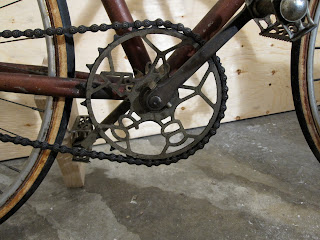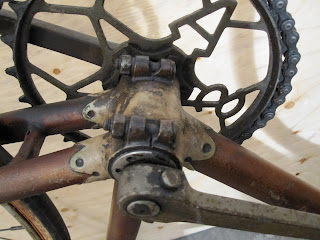
 BSA inch-pitch chainring and La Ccuronne crankset.
BSA inch-pitch chainring and La Ccuronne crankset. Part of the drive for me to collect racing bicycles is the need to preserve their history. It's a strange motivation considering I rarely get any first-hand information on the bikes I find. Buying a 40-year-old bicycle from its original owner is rare, so I mostly have to rely on clues gathered form both the seller and the bike itself. Sellers are generally not that helpful to me, as most of the bikes I've found were purchased from people outside the bicycle trade who don't often have much interest in what they have. The bikes themselves usually have serial numbers that can often be used to date them or even date codes stamped on key components. Sometimes a bike will have the original dealer sticker on it or a dated bicycle licence but, in general, it takes quite a bit of research and accumulated knowledge to build any history on them. This bike is a perfect example of this piecing together of a history.
I found this bike through my friend Neil who spotted it in an antique store while visiting Detroit. He sent me an image and from that I could see it was an interesting track racing bike probably dating from the thirties. I'm obviously a junkie so I convinced Neil and my girlfriend, Amy to go on a roadtrip to Detroit to see if the bike was still there. The "shop" Neil found it in was literally a few dingy rooms on the ground floor of a huge abandoned auto-parts plant. It really seemed like the dealer was squatting there but in the context of the weird, wonderful urban fabric of post-industrial Detroit it made sense. He was a nice guy and told me a few things he knew about the bike. He first said it had been used in the olympics, which is a highly unlikely claim that has been made to me by a surprisingly large number of antique dealers when they are showing me an old racing bike. He bought the bike from the original owner, a 95-year old guy who was moving to Florida, who had sold him not just the bike but over 100 pairs of speedskates and "a bunch of guns". The only other information the dealer knew was that the guy had the bike custom built for him at a shop on Gratiot Street (only two blocks away from where we were) and that for years there had been an outdoor velodrome in downtown Detroit. As we were packing the bike in our car a man walking by added some more information when he said to us in passing, "that looks like a Wolverine bike". The Wolverines turned out to be Detroit's oldest cycling club and a key clue in researching the likely history of the bike.
Looking at the bike, it seems probable that it is from the thirties, which is in line with the original owners age. The geometry and components are similar to other thirties track bikes I've seen but, in reality, they are not definitive of the time period. There are no decals on it or headbadge to point to any specific maker and the paint, while very old, may not be original. There are a number of unique details that could help identify who built it : the headset cups are integrated into the headtube, the bottom bracket uses pinchbolts instead of a lockring to secure it, the stem and handlebars are a fixed unit, and the odd mix of frame lugs. But, until I see another bike with any of these features, they don't tell me much more then the builder was perhaps doing innovative work for the time.
The components offer a little help. The Inch-pitch chain, BSA chainring and Phillips pedals are correct for the time but the crank is from a mystery maker. On one arm it is stamped "PV" and on the other "LA CCURONNE". It is rare to find absolutely no reference to a bicycle brand but I couldn't find any mention anywhere of these cranks, so again, until I see them on another bike they remain a potential clue.
The bikes wheels add a little bit of historical context to its story. While they are not original to the bike they are very much original to Detroit. They were made by George Omelenchuk, a local legend who fabricated custom racing parts during the fifties and sixties. The owner most likely changed the wheels in the fifties as the hubs are French Pelliseir's from that period. The original rims were definitely made of wood and the hubs probably of steel so these aluminum replacements were a state-of-the-art upgrade, something that tells me that this bike had a long career on the track. The unique thing about these Omelenchuk rims is he drilled a huge, half inch hole between each spoke to lighten the rim.
The final element on the bike that could help to reveal the history of it is the dealer sticker on the seat-tube. Unfortunately, its a later sticker so it doesn't reveal much, and my searches haven't been able to find anything on Woods Bike Shop or who "Buff" Lindon is.
So there it is. Everything I presently know about a bike that has seventy-five years of history behind it. Its hard to say if I will ever be able to add anything more definite to its past but, as track bicycles of this era were built solely for sport, I can be sure it has been a witness to both the rise and fall of velodrome racing in American culture and, sadly, the rise and fall of industrial Detroit.












